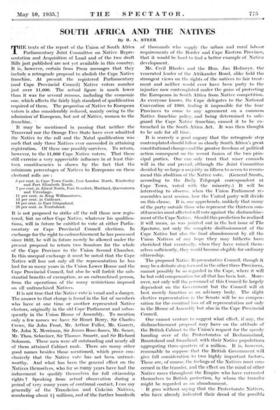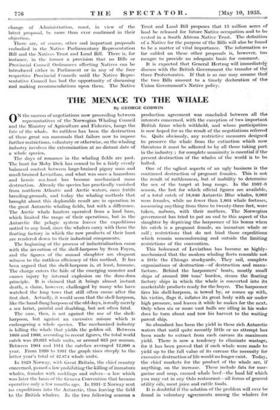SOUTH AFRICA AND THE NATIVES
By B. A. STEER
THE texts of the report of the Union of South Africa
,.
Parliamentary Joint Committee on Native Repre: sentation and Acquisition of Land and of the two draft Bills just published. are not yet available_ in this country. It is? however, certain from Press. messages that they. includç. a retrograde proposal to abolish the Cape Native franchise. At present the registered Parliamentary (and Cape Provincial Council) Native voters number just over 71,000. The actual figure is much lower than it was for several reasons, including the economic one, which affects the fairly high standard of qualification required Of them. The proportion of Native to European voters is also considerably reduced, mainly owing to the admission-of European, but not Of:NatiVe, lionten to the franchise.
It may be Mentioned in passing that neither the Transvaal nor the Orange Free State have ever admitted the 'Native to the roll and the Natal qualification was such that only three Natives ever succeeded in attaining registration. Of these one possibly survives. To return, however, to the 11,000 Cape Native Voters. That these still exercise a very appreciable influence in at least thir- teen constituencies is shown by the fact that the minimum percentages of Natives to Europeans on' these *electoral rolls are : 5 percent. in Cape Town Castle,-East London North, Kimberley
• a,nd:Port Elizabeth North.
7 per cent. in Aliwal North, Fort Beaufort, Maitland, Queenstown • and titenhago. . 11 per cent. in King Williamstown.
13 per cent. in Cathcart. 18 per Cent. in East Griqualand. 28 per cent. in Tembuland. •
It is not proposed to strike off the roll those new regis- tered, hilt no other Cape Native, whatever his qualifica- tions will in future be entitled to vote at either Parlia- mentary or Cape Provincial Council 'elections. In exchange for the right to enfranchisement he has possessed since 1852; he will in future merely be allowed under the present proposal to return two Senators for the whole of the Cape Province to the Union Second Chamber. In this unequal exchange it must be noted that the Cape Native will lose not only all the representation he has had for so many years in the Union Lower House and the Cape Provincial Council, but also he will forfeit the sub- stantial benefits of exemption, as an enfranchised person, from the operations of the many reitrictions imposed on all unfranchised Natives. .
' It'is not true that the Native Vote'is venal-and:a danger. The answer to that charge is found in the list of member who" have at one time or another represented Native :electors., originally in the old Cape -Parliament and §itbse-- quently in the Union House of Assembly. To mention only a few names we have Sir Bisset Berry, -Sir- Charles Crewe; Sir 'Sohn Frost, Mr. Arthnr. Fuller, Mr. Garrett, Mr: John X. Merriman, Sir James Rose-limes, Mi. Sauer, Mr. Theo. Schreiner, Sir Thomas Smartt, and Sir Richard Solomon. - These 'men were all outstanding and nearly all of them attained Cabinet rank. There are many other good names- besides those mentioned; which prove con:. elusively that the Native vote has not been untrust- worthy. And what has been the general effect on the .Natives themstives, who for so many years have had the *inducement to qualify theniselves* for. full citizenship rights ? Speaking from actual observation during .a period. of very many years of continual. contaa; I can say generally of the Tran§leiari and Ciskeian Natives, numbering about i millions, and-of-the further hundreds of thousands who supply the urban and rural labour requirements of the Border and Cape. Eastern Province, that it would be hard to find a better example of Native development.
Mr. :Cecil Rhodes and the Hon. Jan Hofmeyr, the venerated leader of the Afrikander Bond, alike held the strongest views on the rights of the natives to fair treat- ment, and :neither _would ever have been :party to the injustice now contemplated under the guise of protecting the Europeans in South Africa from Native competition. As everyone _knows, the Cape delegates to the National Convention of 1909, finding it impossible for the four Provinces to come to any. agreement on a common Native: franchise policy, and being determined to safe- guard the Cape Native franchise, caused it to be en- trenched in the South Africa Act. It was then thought to be safe for all time.
• It is scarcely a good augury that the retrograde step contemplated should follow so closely South Africa's great constitutional changes and the greater freedom of political action consequent on the recent fusion of the two prin- cipal parties. One can only trust that wiser counsels will in the end prevail, although the Joint Committee decided by so large a majoilty as fifteen to seven to recom- mend this abolition of the Native vote. (General Smuts, according to the Daily Telegraph correspondent at Cape Town, voted with the minority.) It will be interesting to observe, when the Union Parliament re- assembles next session, how the United party will divide on this clause. It is, one apprehends, unlikely that many of the party outside those who represent the thirteen 'con- stituencies Most affected will vote against the disfranchise- ment of the' Cape Native. Should this prediction be realized it will mean, as was pointed out in the last issue of The spectator, *not only the complete disillusionment. of the Cape Native but also the final abandonment by all the Union Natives of any hope they may hitherto have cheri*shed that eventually, when they have raised them- selves sufficiently, they would become elegible for ordinary citizenship. • The proposed Native Representative Connell, though it may be .a definite step forward in the other three Provinces, ea. nnot poss. ibly be so regarded in the Cape, where it will be but cold compensation for all that has been lost. More- Over, not only will the personnel of this Council be largely dependent on the Government but the Council will at best 'inere4' function as an advisory body. The slight elective representation in the Senate will be no conipen, sation for the eventual loss of all representation not only in the House of Assembly but also in the Cape Provincial Council.
One cannot venture to suggest what effect, if any, the disfranchisement proposal may have on the attitude of the British Cabinet to the Union's request for the speedy handing Over of the Protectorates of Bechuanaland, Basutoland and Swaziland, with their Native populations aggregating three-quarters of a million. It is, however, reasonable to suppose that the British. Government will give full consideration to two highly important factors: These are, of course, the feelings of the Natives most con- cerned in the transfer, and the effect on the mind of other Native races throughout the Empire who have entrusted themselves to British protection, by whom the transfer might be regarded as an abandonment. • It goes -without saying that the Protectorate Natives, who have 'already indicated their "dread of the possible change of Administration, must, in view of the latest proposal, be more than ever confirmed in their objection.
There are, of course, other and important proposals embodied in the Native Parliamentary Representation Bill and the Natives Trust and Land Bill. There is, for instance, in the former a provision that no Bills or Provincial Council Ordinances affecting Natives can be introduced either in Parliament or in any of the four respective Provincial Councils until the Native Repre-; sentative Council has had the opportunity of discussing and making recommendations upon them. The Native Trust and Land Bill proposes that 15 million acres of land be released for future Native occupation and to be _vested in a South African Native Trust. The definition of a Native for the purpose of the Bills will also be found to be a matter of vital importance. The information so far cabled on these other proposals is, however, too meagre to• provide an adequate basis for comment.
It is expected that General Hertzog will immediateN discuss with the British Government the transfer of the three Protectorates. If that is so One may assume thai the two Bills amount to a timely declaration of the - Union Government's Native policy.



































































 Previous page
Previous page